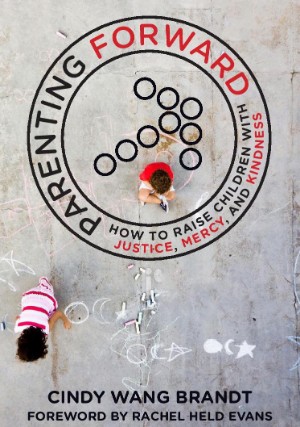Get the inside scoop from our conversation with Cindy Wang Brandt, author of Parenting Forward: How to Raise Children with Justice, Mercy, and Kindness, a phenomenal new book we’ve all been searching for.
Have you ever looked for solid faith-inspired parenting guidance? Some of us might have come up with only a few resources. And maybe some of us have given up trying after repeated disappointment. Well, we’ve got some great news. We found a serious gem for you to check out!
Here at Illustrated Children’s Ministry, we believe Parenting Forward by Cindy Wang Brandt is the book so many parents and church workers have long been searching for. And for the inside scoop, we got the chance to chat with Cindy herself.
Cindy speaks with such honesty, thoughtfulness, and grace. We think you’ll find her to be refreshing and her work to be a helpful tool for the journey. Oh, and drop your name in the hat to download the first chapter for free!
FREE CHAPTER SAMPLE
Would you like to download a free chapter from Cindy’s book. To receive your PDF download of the first chapter, click here!Brought to Life
Q: First, Cindy, thanks so much for getting together to talk with us about Parenting Forward. How did you come to bring this book into the world?
A: As someone who grew up conservative evangelical, like many others in my generation, I’m starting to re-think a lot of my faith values. And as a parent, I realized that teaching children faith values I had not been taught, or have shifted away from, caused tension.
I needed to find a community who would wrestle with me, and join me in the task of re-imagining a faith that is relevant for our children and healthier for their well-being.
This book is a culmination of the conversations I’ve had with parenting and faith experts, and everyday parents, answering this guiding question: What does it look like to raise children WITH justice FOR justice?

Q: What was the journey of writing Parenting Forward like?
A: Before I wrote this book, I spent my writing time in faith spaces and social justice conversations. I contended with big, serious theological propositions, and got outraged over injustice, to the point of burning out
Writing this book allowed me to approach these critically important justice conversations from the perspective of children
Anytime we are lucky enough to be in close proximity with children, they give us great joy. Their whimsy, vitality, and their always-surprising perspectives, are such a gift. The process of writing the book taught me that children and young people are essential for sustaining our justice movements because their presence is an everflowing source of hope.
Power Placement
Q: The element of allowing children autonomy and agency is an important one for you, which opposes a long-standing culture of children being seen and not heard. How can ministry leaders practically create environments that foster children’s autonomy and honor children’s voices?
A: When we think of inclusion, we often make the mistake of thinking being welcoming is enough. But it’s not enough to just welcome all different kinds of people into the church. We need to look at the leadership structure: who has the power to make the decisions that impact the church?
True inclusion gives access to those spaces – the decision-making spaces. For children, it’s not enough to tack children on to programs at the last minute and announce that children are very welcome. Children should be involved at the beginning of the planning process, and their opinions should be solicited and taken into consideration.
Of course, we can’t expect children to sit through hour-long church meetings (adults could stand to rethink hour-long meetings as well, for what it’s worth). However, we need to find ways to involve children’s participation in programming that’s designed for them.
Q: What markers can families look for in order to identify churches that are practicing justice with children?
A: I’d look for explicit affirmation of children in church bulletins, announcements, and whether children are given access in church spaces.
More broadly, I’d be on the lookout for authoritarianism in a church. Whenever a strict hierarchy is imposed where power flows from the top down, it’s a bad environment for children, because they always end up at the bottom of every hierarchy and given little control.
Again, look for where the power is located. If it’s centralized in solely patriarchal figures, that’s a red flag. If the power is distributed to groups and committees that are represented by women and other marginalized people, it is better positioned to treat children with justice.

Healthy Instruction
Q: Can you tell us a bit about teaching the Bible so kids use their power for justice and come away with a healthy spirituality?
A: Offer it to them not as doctrine, but as one tool out of many that they can use to exercise their spirituality. Give them responsible hermeneutics; in other words, help them learn the Bible in the way the Bible should be read, and not as a fundamentalist Bible Thumper. This includes situating Bible stories within a larger narrative framework, understanding the various genres, and doing critical engagement with the text.
Some of the potential pitfalls of incorrectly teaching the Bible to children include:
- convincing children to use it as a moral manual (or map)
- teaching children that the Bible should primarily be used as a tool for apologetics
(Psst… read even more about teaching kids how to use the Bible over here…)
For Further Reading
Q: What resources can you recommend to readers that have guided your journey in raising kids justly?
A: I love the book Raising White Kids, by Jennifer Harvey for inspiring racial justice. If you’re interested in diversifying your bookshelves, my favorite children’s book curation site is Books for Littles. Check out Amaze.org for quality sex education resources. Queer Kids Stuff is great, too, and teaches younger, pre-school kids about the gender spectrum. I’m really into what Radical Cram School is creating around diverse Asian girls’ voices.
For ministry resources…well, my go-to recommendation is Illustrated Children’s Ministry. (wink, wink) But I’ve also curated a list of children’s books for progressive spirituality over on Amazon.
Q: Again, thanks so much, Cindy. Where can our readers learn more about you and follow your work?
A: Thanks so much for having me! Check out more about me and my work over on my website.
Friends, do yourself a favor and grab a copy of Parenting Forward: How to Raise Children with Justice, Mercy, and Kindness.


Leave a Reply